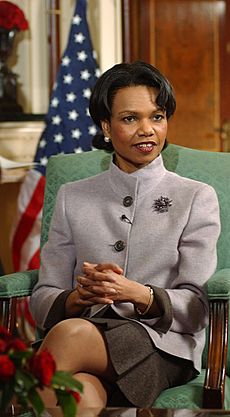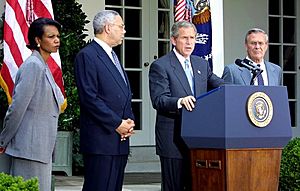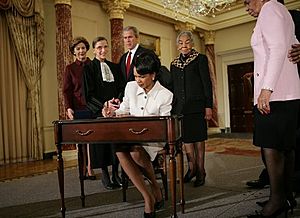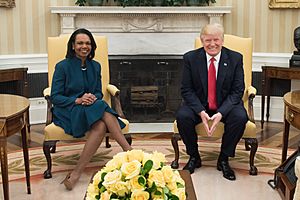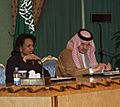Condoleezza Rice facts for kids
Quick facts for kids
Condoleezza Rice
|
|
|---|---|
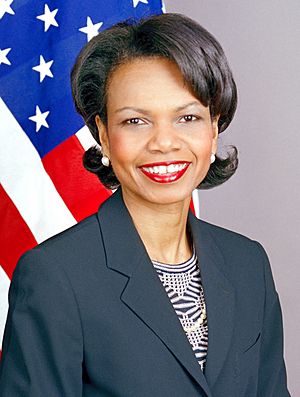
Official portrait, 2005
|
|
| 66th United States Secretary of State | |
| In office January 26, 2005 – January 20, 2009 |
|
| President | George W. Bush |
| Deputy |
|
| Preceded by | Colin Powell |
| Succeeded by | Hillary Clinton |
| 19th United States National Security Advisor | |
| In office January 20, 2001 – January 26, 2005 |
|
| President | George W. Bush |
| Deputy | Stephen Hadley |
| Preceded by | Sandy Berger |
| Succeeded by | Stephen Hadley |
| 8th Director of the Hoover Institution | |
| Assumed office September 1, 2020 |
|
| Preceded by | Thomas W. Gilligan |
| 10th Provost of Stanford University | |
| In office September 1, 1993 – June 30, 1999 |
|
| Preceded by | Gerald Lieberman |
| Succeeded by | John L. Hennessy |
| Personal details | |
| Born | November 14, 1954 Birmingham, Alabama, U.S. |
| Political party | Democratic (before 1982) Republican (1982 – Present) |
| Education | University of Denver (B.A., Ph.D.) University of Notre Dame (M.A.) |
| Signature | |
| Scientific career | |
| Fields | Political science |
| Thesis | The Politics of Client Command: Party-Military Relations in Czechoslovakia, 1948–1975 (1981) |
Condoleezza "Condi" Rice (born November 14, 1954) is an American diplomat and expert in political science. She is currently the director of the Hoover Institution at Stanford University. As a member of the Republican Party, she has held some of the most important jobs in the U.S. government.
Rice served as the 66th United States Secretary of State from 2005 to 2009. She was the first African-American woman to hold this position. Before that, she was the 19th U.S. National Security Advisor from 2001 to 2005, the first woman ever to do so.
For a time, Rice and her predecessor, Colin Powell, were the highest-ranking African Americans in the history of the U.S. government's executive branch. This was because the Secretary of State is fourth in the line to become president.
Contents
Early Life and Education
Condoleezza Rice was born in Birmingham, Alabama. She was the only child of Angelena Rice and John Wesley Rice Jr. Her mother was a high school teacher. Her father was a guidance counselor, minister, and college dean. Her unique name, Condoleezza, comes from the Italian music term "con dolcezza," meaning "with sweetness."
Her family has deep roots in the American South. Some of her ancestors were sharecroppers after slavery ended. She learned that her family has African, European, and Asian or Native American heritage.
Dr. Rice grew up in Birmingham and then Tuscaloosa, Alabama. This was a time when laws enforced racial segregation. This meant that black and white people were often kept separate. Her parents taught her to be proud and to overcome the unfairness of the time.
From a young age, Rice was very talented. She started learning French, music, figure skating, and ballet at age three. She was a gifted pianist and hoped to become a professional musician.
Moving to Denver and Changing Goals
In 1967, her family moved to Denver, Colorado. She graduated from high school when she was only 16. Rice went to the University of Denver, where her father worked. She first studied music, but she realized that other students were more talented. This made her question if she could have a career as a pianist.
She took a class on international politics taught by Josef Korbel. This class sparked her interest in the Soviet Union and how countries work together. Korbel, who was the father of future Secretary of State Madeleine Albright, became a very important person in her life.
Rice changed her major to political science. She earned her bachelor's degree from the University of Denver, a master's degree from the University of Notre Dame, and a Ph.D. (a high-level academic degree) from the University of Denver's School of International Studies in 1981.
Academic and Early Political Career
Rice began her career as a professor at Stanford University, where she specialized in the Soviet Union. Her knowledge caught the attention of Brent Scowcroft, who was the National Security Advisor for President George H. W. Bush.
From 1989 to 1991, she worked on the National Security Council as an expert on the Soviet Union and Eastern Europe. This was a very important time in history, as the Berlin Wall fell and the Soviet Union was breaking apart. President Bush trusted her advice greatly when dealing with Soviet leaders like Mikhail Gorbachev.
In 1991, Rice returned to Stanford. In 1993, she was appointed as the university's provost. This meant she was in charge of the university's budget and academic programs. She was the first woman, first African-American, and youngest person to ever hold that job at Stanford. She successfully managed the university's budget, turning a $20 million deficit into a $14.5 million surplus.
Working in the White House
Rice's experience in government and academics prepared her for top roles in Washington, D.C. She became a key advisor to George W. Bush during his presidential campaign in 2000.
National Security Advisor (2001–2005)
When George W. Bush became president in 2001, he named Rice his National Security Advisor. She was the first woman to hold this powerful position. Her job was to advise the president on all matters of national security and foreign policy.
Her time as National Security Advisor was shaped by the September 11, 2001, terrorist attacks. Before the attacks, the CIA had warned of a possible attack by the terrorist group al Qaeda. After the attacks, Rice and the Bush administration focused on fighting terrorism and preventing future attacks.
Rice was also a strong supporter of the 2003 invasion of Iraq. She argued that Iraqi leader Saddam Hussein was a threat because he might have weapons of mass destruction (WMDs). She famously said, "we don't want the smoking gun to be a mushroom cloud." Later, no WMDs were found in Iraq, which led to criticism of her earlier statements.
Secretary of State (2005–2009)
In President Bush's second term, Rice was appointed United States Secretary of State. She was the second woman and the first African-American woman to hold the job. As Secretary of State, she was America's top diplomat, responsible for the country's relationships with the rest of the world.
Rice promoted a policy called "Transformational Diplomacy." The goal was to encourage the growth of democratic governments, especially in the Greater Middle East. She traveled the world, meeting with foreign leaders to advance American interests and values.
She played a key role in talks with North Korea about its nuclear weapons program. These "six-party talks" included China, Japan, Russia, and South Korea. The goal was to convince North Korea to give up its nuclear weapons in exchange for aid and security guarantees.
Life After Washington
After leaving the government in 2009, Rice returned to Stanford University. She is a professor of political science and a senior fellow at the Hoover Institution. In 2020, she became the director of the Hoover Institution.
She has written several books, including memoirs about her family and her time in Washington. She also co-authored a book about democracy.
Rice has remained active in public life. She is on the board of directors for companies like Dropbox. In 2022, she became a part-owner of the Denver Broncos NFL team. She was also one of the first two women admitted as members to the famous Augusta National Golf Club.
Personal Life
Rice has never married and has no children. She is a devoted football fan, especially of the Cleveland Browns.
Rice is a talented classical pianist and once dreamed of being a concert musician. She still plays piano and has performed with famous musicians like cellist Yo-Yo Ma.
Images for kids
See also
 In Spanish: Condoleezza Rice para niños
In Spanish: Condoleezza Rice para niños
 | Kyle Baker |
 | Joseph Yoakum |
 | Laura Wheeler Waring |
 | Henry Ossawa Tanner |


